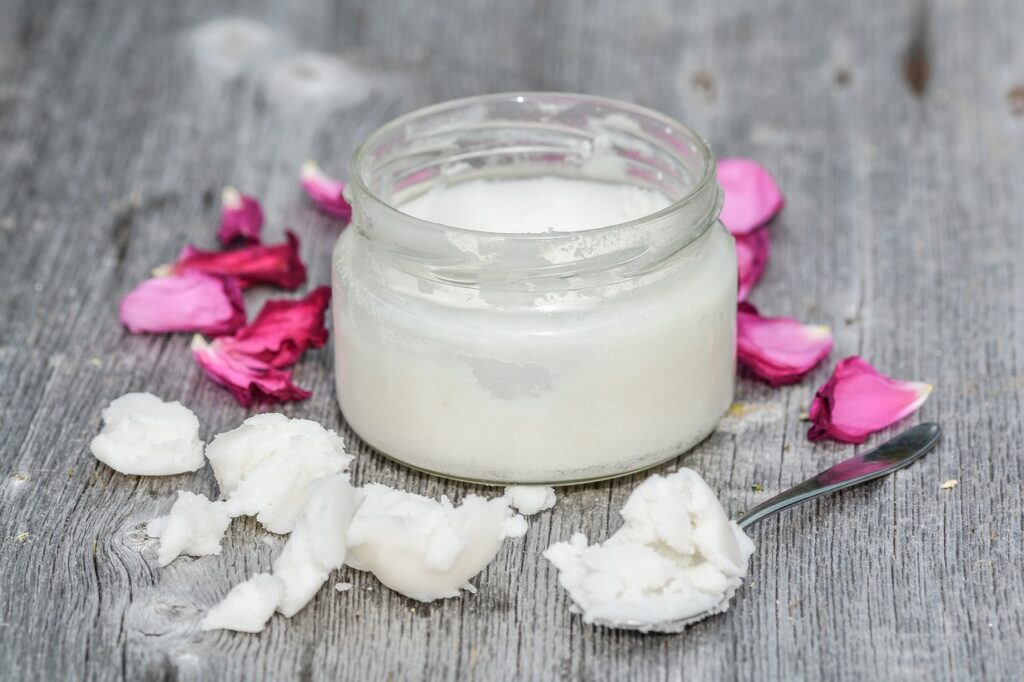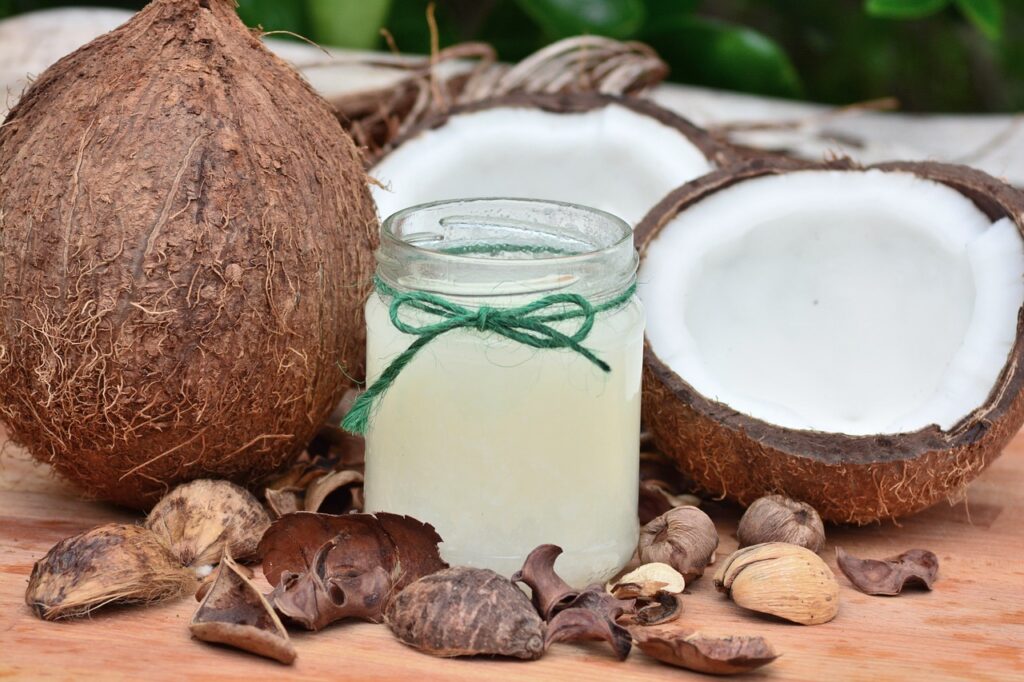If you know me, you know how much I absolutely LOVE coconut oil. It has so many health benefits that it has now quickly turned into one of those must-have desert island products for me. From oil pulling to GI support, it is incredibly multipurpose and something that virtually anyone can benefit from incorporating into their everyday health and wellness routine. Let’s discuss some of the glorious health benefits of consuming and utilizing coconut oil in your everyday health and wellness routine.

1. Nutrient-Rich Powerhouse
- Healthy Fats for Brain and Body Fuel
Coconut oil is rich in medium-chain triglycerides (MCTs), providing a quick and efficient source of energy. Incorporating MCTs into your diet can support metabolic health and even aid in weight loss efforts. Given the amount of saturated fat, coconut oil has also been shown to improve cognition and support brain health.
- Hormone Hero
Coconut oil contains healthy fatty acids like lauric acid, which may contribute to a favorable lipid profile and overall hormone health. This proves to be especially beneficial in women’s health.
2. Immune Boosting Properties
- Lauric Acid and Antimicrobial Magic
The lauric acid in coconut oil turns into monolaurin in the body, exhibiting potent antimicrobial properties. This can boost the immune system, helping the body ward off infections.
- Microbiome Support
Given the antimicrobial benefits of coconut oil, it serves as a very effective way to ward off parasites and keep fungus in check. A few years ago, I was struggling with a giardia infection and coconut was a supplement I took regularly to keep the inflammation in my GI tract at bay. I still take it regularly on an empty stomach in between meals for general gut and digestive support.
- Antioxidant Shield
Coconut oil’s antioxidant content helps neutralize free radicals, providing an additional layer of defense against oxidative stress and inflammation.
3. Oral Health Oasis
- Oil Pulling for Oral Hygiene
Incorporating coconut oil into oil pulling routines can enhance oral health. The antimicrobial properties help combat harmful bacteria, promoting gum health and preventing bad breath. I oil pull with coconut oil every morning and have noticed a huge difference in my oral health!
- Natural Toothpaste
Coconut oil’s antibacterial properties make it an excellent base for DIY toothpaste. Combining it with baking soda and essential oils creates a natural toothpaste that supports oral hygiene.
4. Balanced Blood Sugar Levels
- Energy Boost without the Crash
Adding coconut oils to meals provides sustained energy without the rapid blood sugar spikes associated with refined carbohydrates. As a result, you may even notice an improved mood due to blood sugar stability from incorporating more healthy fats.
5. Versatile Culinary Companion
- Heat Stable Cooking Oil
Coconut oil’s high smoke point makes it an ideal choice for cooking at high temperatures. Its stability prevents the formation of harmful compounds, making it a safer option for frying and sauteing.
- Flavorful Addition to Dishes
Beyond its functional benefits, coconut oil imparts a delightful tropical flavor to both sweet and savory dishes, enhancing the culinary experience.
6. Self Care Savior
- Moisturizing Miracle
Coconut oil makes for a wonderfully hydrating body oil. I love lathering it all over my skin after I shower or as part of my abhyanga routine.
- Carrier Oil
Coconut oil makes for an excellent carrier oil when working with essential oils. I find myself making different blends to use on specific areas of my body for both medicinal and aromatherapy benefits.

How to Incorporate Coconut Oil into Your Routine
Here are some simple ways to start enjoying the benefits of coconut oil:
- Cooking: Use coconut oil for sautéing, baking, or as a replacement for butter in your recipes.
- Smoothies: Add a tablespoon of coconut oil to your smoothies for an energy boost.
- Skin Care: Apply coconut oil directly to your skin as a moisturizer or mix it with essential oils for added benefits.
- Hair Care: Use coconut oil as a hair mask or apply it to your hair ends for added shine and moisture.
Nutritional Profile of Coconut Oil
Coconut oil is not only renowned for its versatility in cooking and skincare but also for its unique nutritional composition. Understanding its nutritional profile can help you appreciate how it contributes to various health benefits.
Fats
Coconut oil is predominantly composed of fats, with about 92% of its total fat content being saturated fats. While saturated fats often get a bad rap, the fats in coconut oil are primarily medium-chain triglycerides (MCTs), which have unique properties and health benefits.
Medium-Chain Triglycerides (MCTs): Unlike long-chain triglycerides found in many other oils, MCTs are more easily digested and quickly converted into energy by the liver. This makes them less likely to be stored as fat. The most prominent MCTs in coconut oil include:
- Lauric Acid: Comprising about 50% of the total fat content, lauric acid has antimicrobial and antiviral properties, supporting immune health.
- Caprylic Acid and Capric Acid: These MCTs also possess antimicrobial benefits and are known for their quick energy release.
Calories
Coconut oil is calorie-dense, providing about 120 calories per tablespoon (14 grams).
Vitamins and Antioxidants
Coconut oil contains small amounts of several vitamins and antioxidants that contribute to its health benefits.
- Vitamin E: This fat-soluble antioxidant helps protect cells from damage caused by free radicals, contributing to healthier skin and reduced signs of aging.
- Polyphenols: Virgin coconut oil retains more of its natural polyphenols, which are antioxidants that help reduce inflammation and support overall health.
Types of Coconut Oil
The nutritional profile can vary slightly depending on the type of coconut oil:
- Virgin Coconut Oil: Extracted from fresh coconut meat without the use of high temperatures or chemicals, virgin coconut oil retains more of its natural antioxidants and nutrients.
- Refined Coconut Oil: Made from dried coconut meat (copra) and often processed with chemicals or heat, refined coconut oil has a higher smoke point but may have fewer antioxidants compared to virgin coconut oil. Refined coconut oil is mostly flavorless.

Frequently Asked Questions (FAQs)
Is coconut oil safe for cooking at high temperatures?
Yes, coconut oil is stable at high temperatures, making it suitable for various cooking methods, including frying, sautéing, and baking. Refined coconut oil, in particular, has a higher smoke point of around 400°F (204°C), while virgin coconut oil has a smoke point of approximately 350°F (177°C).
Does coconut oil go bad? How should I store it?
Coconut oil has a long shelf life, typically lasting up to two years if stored properly. Keep it in a cool, dark place, away from direct sunlight and heat. Virgin coconut oil can solidify at temperatures below 76°F (24°C) and liquefy above this temperature. Both states are normal and do not affect the quality of the oil.
Is coconut oil suitable for people with allergies?
Coconut is classified as a tree nut by the U.S. Food and Drug Administration (FDA), but allergic reactions to coconut oil are rare. If you have a tree nut allergy, it’s advisable to consult with a healthcare professional before using coconut oil.
What are some of your favorite ways to use coconut oil? Let me know in the comments below!
This post was all about the health benefits of coconut oil.
Other posts you may like:
- 7 Remarkable Health Benefits of Ginger
- 7 Incredible Magnesium Oil Spray Benefits
- 7 Fantastic Health Benefits of Taking Shilajit Every Day
Hi love!
I’m a Nutritional Therapy Practitioner and Dharmic Healer looking to guide you back to your true Self through various mind, body, and spirit healing modalities.
I’m Rana.
LEARN MORE
Leave a Reply Cancel reply
Rana is a Nutritional Therapy Practitioner and Dharmic Healer here to guide you back to your true Self through various mind, body, and spirit healing modalities.
HOME
ABOUT
CONTACT
BLOG
SHOP
OFFERINGS
© Mantras and Mulberries.
Good day! I just would like to give you a huge thumbs up for the
excellent info you’ve got right here on this post.
I am coming back to your site for more soon.
Thank you, Ron!